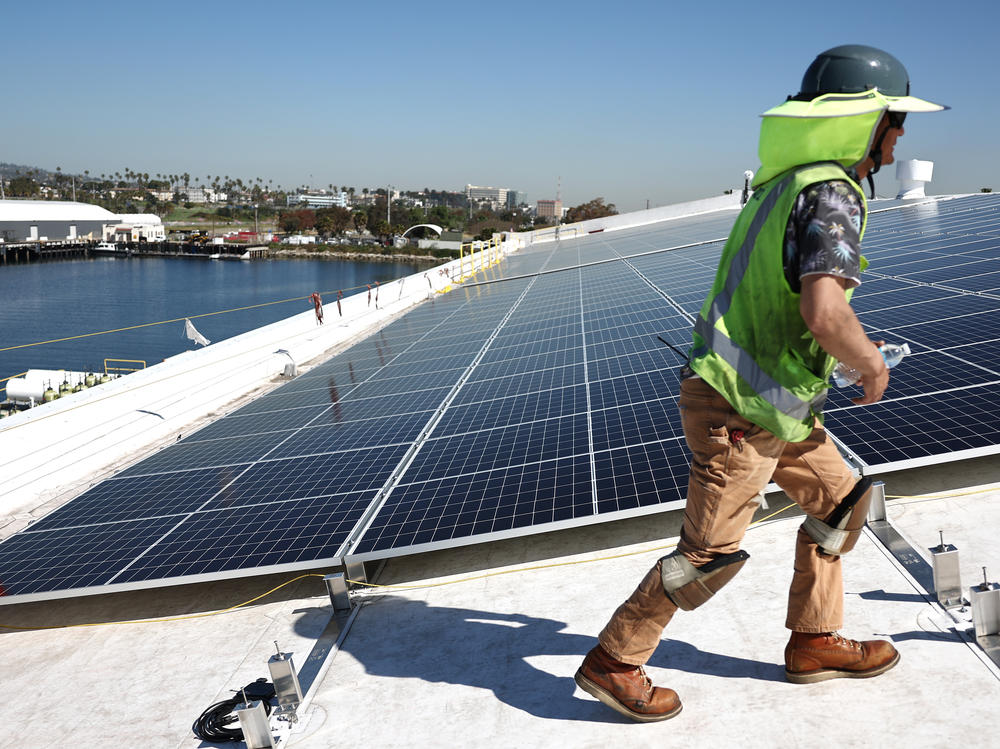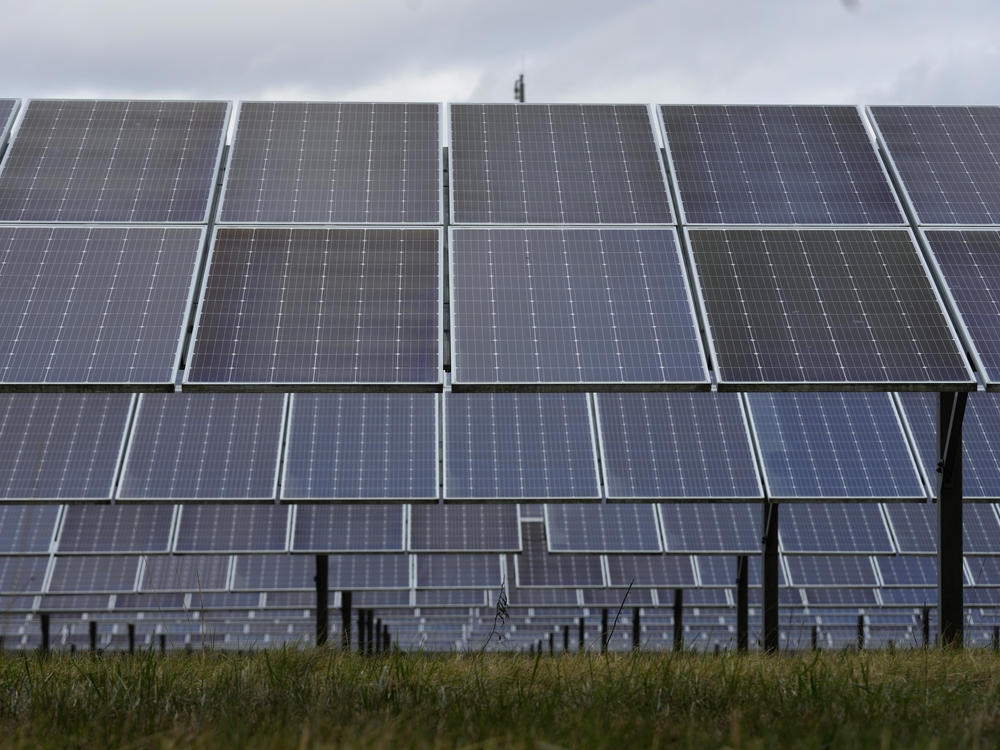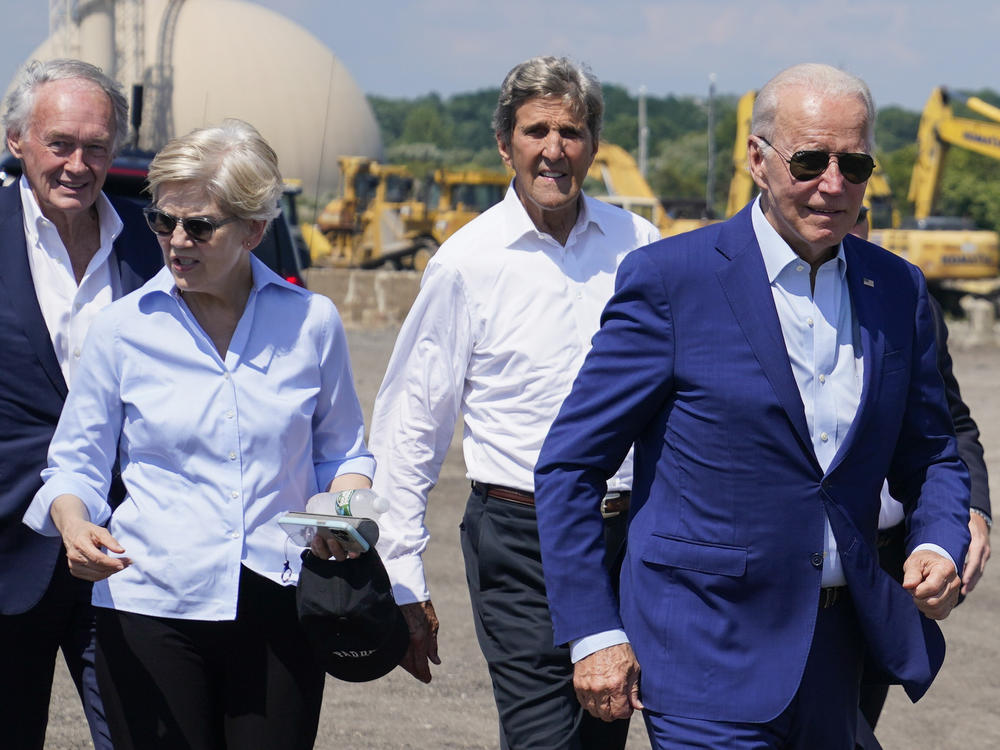Section Branding
Header Content
The U.S. imports most of its solar panels. A new ruling may make that more expensive
Primary Content
Updated August 18, 2023 at 12:01 PM ET
The Department of Commerce has determined that solar panel manufacturers in four Southeast Asian countries are evading U.S. trade rules by using Chinese-sourced materials subject to tariffs without paying applicable duties. Those countries — Vietnam, Malaysia, Thailand, and Cambodia — are responsible for nearly three-quarters of solar modules imported to the United States.
The ruling, unveiled Friday, means that new U.S. solar projects may soon be more expensive: manufacturers whose goods run afoul of Obama-era solar tariffs will be subject to additional import duties on their products.
Those duties, however, will not begin to be assessed until June 2024, when a waiver put in place by the Biden administration is set to expire.
The cost of solar projects is incredibly important as the U.S. races to zero-out power sector greenhouse gas emissions — currently responsible for a quarter of the country's total — by 2035.
The world must limit average global warming to about 2.7 degrees Fahrenheit to avoid the most dire effects of climate change. It is not currently on track to achieve that goal.
Already in the United States, average summer temperatures have climbed more than two degrees since 1970 — and winter averages have warmed more than three degrees.
The investigation upended the solar industry, until Biden stepped in
The Commerce Department's investigation began in March 2022 in response to a complaint from a small U.S. manufacturer, Auxin Solar. It has been a major source of friction inside President Biden's administration.
The department's inquiry contributed to a major drop in solar installation forecasts, according to the Solar Energy Industries Association, as installers worried that their projects would become cost-prohibitive if the government imposed retroactive taxes or if the cost of future purchases increased.
"Worst-case scenario, you can think about retroactive tariffs of up to 240%," Leo Azevedo, a solar procurement manager, told NPR in May 2022. "There's just too much risk to order panels right now and that's just the end of it."
Energy Secretary Jennifer Granholm weighed in on the matter during congressional testimony the same month.
"At stake is the complete smothering of the investment and the jobs and the independence that we would be seeking as a nation to get our fuel from our own generation sources," Granholm said. "I certainly am deeply concerned about being able to achieve the goal of getting to 100% clean electricity by 2035 if this is not resolved quickly."
Commerce Secretary Gina Raimondo insisted that her department was legally required to investigate. She said the process, conducted by career staff at the International Trade Administration, was entirely apolitical, despite its impact on the administration's energy agenda.
Biden offers a reprieve
Two months after the investigation began, Biden stepped in with a compromise. He allowed the investigation into trade abuses to proceed, but waived the possibility of trade duties on solar modules imported from Cambodia, Malaysia, Thailand and Vietnam until June 2024 — granting the solar industry a measure of certainty as it planned new projects while the inquiry was underway.
The president also invoked the Defense Production Act to help expand American solar panel manufacturing and other clean energy technology, and directed the federal government to increase the amount of U.S.-made solar panels and clean technology products it buys.
The president's maneuver ultimately drew congressional backlash. A bipartisan majority passed a bill to strike the president's waiver in May of this year, worried about how the move would impact American manufacturers.
The president vetoed the legislation and it did not take effect.
The investigation concludes
Friday's ruling from the Commerce Department did not come as a great surprise to the solar industry. Investigators had issued a preliminary ruling in December that found four of the eight suppliers under investigation were circumventing U.S. duties on Chinese-made solar cells. The final investigation revised that finding to five of the eight suppliers.
The ruling means that, in order to be exempt from U.S. duties, all solar providers in Vietnam, Malaysia, Thailand, and Cambodia — including companies not specifically investigated by the Commerce Department — must self-certify that they are complying with all trade rules. Those claims are subject to potential audit.
Mamun Rashid, chief executive of Auxin Solar — the company that launched the probe — celebrated the ruling.
"For years, the Chinese have flouted the U.S. trade remedy laws and today, with Commerce's affirmative country-wide circumvention decisions on Cambodia, Malaysia, Thailand, and Vietnam, we've successfully closed these loopholes," Rashid said in a statement, urging Biden to lift his waiver.
Solar industry advocacy groups, though, have been hostile to the investigation, saying it puts jobs in their sector at risk.
"The U.S. Department of Commerce is out of step with the administration's clean energy goals, and we fundamentally disagree with their decision," said Abigail Ross Hopper, head of the Solar Energy Industries Association. "It will take at least three to five years to ramp up domestic solar manufacturing capacity and the global supply chain will be vital in the short-term."
Too soon to tell how the final ruling will reshape the industry
Biden's waiver temporarily exempting the solar industry from any new costs associated with the investigations is supposed to allow installers to adjust their supply chains to ensure compliance with U.S. trade rules and buy time for the domestic solar manufacturing industry to mature.
Domestic solar manufacturing is set to soar over the next seven years with investments from Biden's signature climate law, the Inflation Reduction Act. By 2030, the U.S. will produce 42 gigawatts of silicon-based solar panels from domestically-sourced parts, up from near-zero today.
But once Biden's tariff waiver expires in June 2024, costs could go up, stalling growth in the solar power industry.
The White House did not immediately reply to a request for comment on the Commerce Department's findings or whether the president would consider extending his solar tariff waiver beyond June 2024.
Copyright 2023 NPR. To see more, visit https://www.npr.org.




